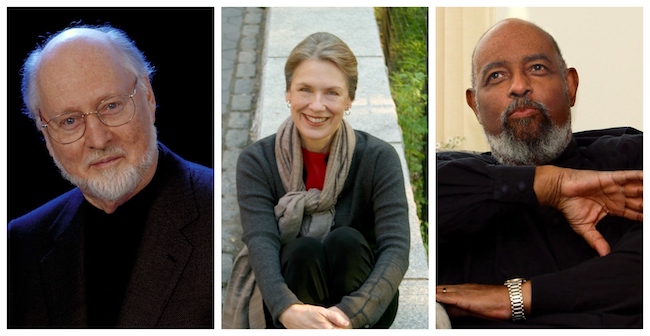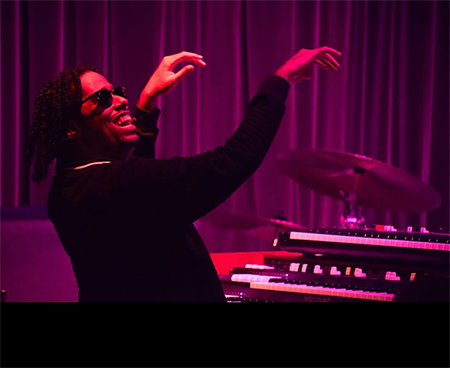by Daniel Hathaway
On Saturday: Tri-C presents Hammond B-3 virtuoso Matthew Whitaker (pictured, Eastern Campus, 7:30), Gospel Meets the Akron Symphony (E.J. Thomas, 7:30), Apollo’s Fire plays virtuoso concerti (St. Paul’s, Cleveland Hts., 7:30), Robert Beckstrom leads the Lorain Civic Orchestra (LCCC, Elyria, 7:30), and cellist Mark Kosower solos with Thomas Guggeis & The Cleveland Orchestra (Severance, 8 pm).
On Sunday: The Cleveland Orchestra repeats Friday’s program (3 pm at Severance), Apollo’s Fire does the same (St. Paul’s, Cleveland Hts., 4 pm), pianist Spencer Myer plays on Music From the Western Reserve series (Christ Church, Hudson, 5 pm), flutist Bart Feller performs at the U. of Akron (Guzzetta Hall, 5:30 pm), and organist David Blazer plays original music for Charlie Chaplin’s 1928 silent film The Circus (West Shore U-U Church, 7 pm)
For details of upcoming events, visit our Concert Listings.
INTERESTING READ:
Independence, MO-based organist Jan Krabill writes on her website:
Back for the 26th year! As always, my annual Super Bowl Sunday organ concert will begin at 2pm and conclude by 3:30, giving us all plenty of time to view all of the big game. And, as always, when our Kansas City Chiefs are in the Super Bowl, I’ll open the concert with a special piece in their honor. And, as always, this concert is FREE admission, and casual dress is fine. Come enjoy the fun!
This year’s concert will be in the Auditorium (green-domed building) at Community of Christ’s headquarters. The theme is “It Takes a Team.” No one — musician, athlete, composer, superstar of any endeavor — operates in a vacuum. We’re all parts of various teams, and we can choose to motivate each other in countless ways. Let’s celebrate teamwork in music, and cheer for the Chiefs’ brilliant teamwork this season!
(The Aeolian-Skinner organ was built in 1959 for the 6,000 seat Auditorium of the Reorganized Church of Jesus Christ of Latter Day Saints and heard in weekly broadcasts by John Obetz from 1968 to 1993.)
WEEKEND ALMANAC:
FEBRUARY 8 — by Jarrett Hoffman:

Brouwer has often been inspired by the environment, and that was certainly the case with her oratorio Voice of the Lake, premiered in its revised version in 2018 in Cleveland. The piece portrays both the magical side of Lake Erie as well as its many environmental problems — and the work that’s being done to solve them. Watch a live performance of Parts I, II, III, and IV, and read Mike Telin’s preview article about the revised version of the oratorio here.
Another composer to celebrate today is John Williams, born on February 8, 1932 in Queens, NY. You very likely know at least a few of his classic film scores, such as Star Wars, Indiana Jones, E.T., Schindler’s List, Jaws, Jurassic Park, and Harry Potter. He’s also composed music for several Olympic games, as well as a long list of concert works, including many concertos.
Here’s one of those for today: The Five Sacred Trees, inspired by ancient Celtic mythology, and written for the New York Philharmonic and principal bassoon Judith LeClair for the orchestra’s 150th anniversary. LeClair recorded the work in 1997 with the London Symphony Orchestra, conducted by none other than John Williams (who in that arena of music-making notably led the Boston Pops for thirteen years). Listen to the concerto here.
Now we pass the baton to the pioneering figure of James DePreist, who died on this date in 2013 in Scottsdale, AZ, and who achieved international renown in a time when Black conductors were rare in the world of classical music.
His most famous position was as music director of the Oregon Symphony (1980-2003). DePreist was heralded for transforming the ensemble from a part-time, regional group to an esteemed one, whose recordings under his leadership were widely acclaimed, including albums devoted to Rachmaninoff and Stravinsky. Listen to their recording of the first movement of Rachmaninoff’s Symphony No. 2 here.
He also served as music director of the Orchestre Symphonique de Québec, the Malmö Symphony, and the Orchestre Philharmonique de Monte Carlo, as permanent conductor of the Tokyo Metropolitan Symphony Orchestra, and as director of orchestral and conducting studies at the Juilliard School.
FEBRUARY 9 — by Daniel Hathaway:
Historical events in classical music that took place on February 9 range from the sublime to the ridiculous.
Let’s start with Austrian composer Alban Berg, who was born in Vienna on this date in 1885. A student of Arnold Schoenberg, Berg is credited with humanizing his mentor’s 12-tone compositional system, overlaying it with a veneer of expressive Romanticism. His fame is inversely proportional to his output, which includes two operas — Wozzeck and the unfinished Lulu — a violin concerto, and some smaller works.
The BBC highlighted Berg’s life in a documentary, and ChamberFest Cleveland included his Adagio for violin (Diana Cohen), clarinet (Franklin Cohen), and piano (Roman Rabinovich) on a concert in CIM’s Mixon Hall on June 21, 2018. That movement was extracted from Berg’s Concerto de chambre for piano, violin, and 13 instruments. And Pierre Boulez chose Berg’s Der Wein to open the 2011 Salzburg Festival with soprano Dorothea Roeschmann and the Vienna Philharmonic.
Two important figures in British choral music were born on this date: Sir George Guest in 1924, and Paul Hillier in 1949.
Guest, born in Wales, was the longtime organist and choirmaster of St. John’s College, Cambridge, where he saved the day school that provided trebles for the chapel choir, and developed a choir that rivaled that of King’s College. Perhaps by design, John’s and King’s scheduled their Choral Evensong services so you could catch both at the expense of a brisk walk.
Guest is the subject of the documentary, “A Guest at Cambridge,” and his last Evensong service, including Gerald Finzi’s Lo, the Full Final Sacrifice was broadcast by the BBC in 1991.
And baritone and conductor Paul Hillier, known for his equal interest in early and contemporary music, founded the Hilliard Ensemble in 1974 and the Theatre of Voices in 1990. Having crossed the pond to direct the Early Music Institute at Indiana University, he extended his geographical reach with the directorship of the Estonian Philharmonic Chamber Choir (2001), Ars Nova Copenhagen (2003) and the National Chamber Choir of Ireland (2008).
For a taste of his work with the Estonian choir, listen to Baltic Voices I, and/or his recording of Arvo Pärt’s Da Pacem.
Some will remember a remarkable noonday concert by Ars Nova Copenhagen at Cleveland’s Trinity Cathedral some years ago, thanks to a happy gap in their touring schedule. I will remember their visit because we all went to dinner at a Chinese restaurant in Playhouse Square where the proprietor had just installed a new karaoke machine and was eager to have the Danes try it out. That didn’t happen, but it would have added to the fun.
And to end with the ridiculous, it was on this date in 1967 that cellist and performance artist Charlotte Moorman was arrested “by two policemen who interrupted her performance at the Cinematheque in Manhattan of Opera Sextronique by Nam June Paik, a composer, video artist and performance artist.” (NY Times Obituary). Moorman was playing in the nude for an invited audience, an episode that branded her as “the topless cellist.”




